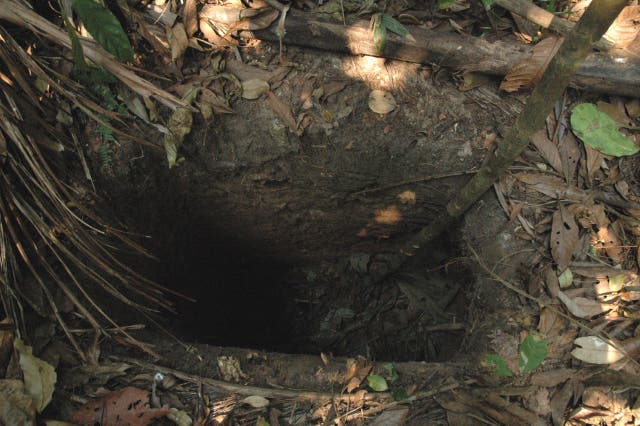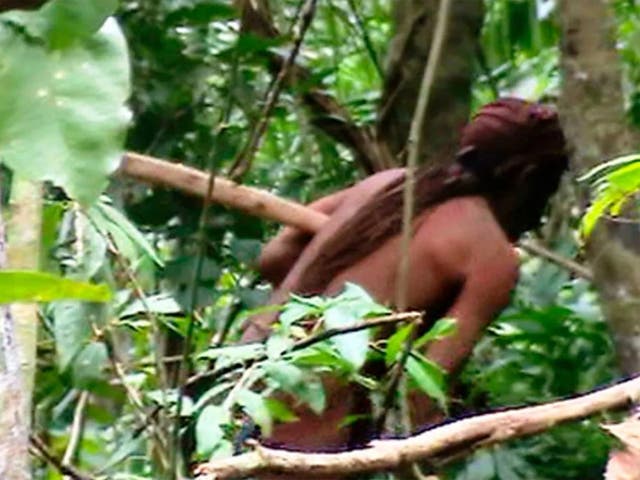Man of the hole’: Last member of uncontacted Amazon tribe dies
Trackers who followed lone survivor for decades found him dead in one of his huts
The last member of an Amazon tribe uncontacted by civilisation has died.
He lived alone for more than 25 years on a 30-square-mile patch of protected land and was known to observers as the “Man of the Hole” for his practice of digging deep pits to hunt animals or hide in.
Little is known about his tribe besides that it was left counting down to extinction after attacks by local farmers from the 1970s left a sole surviving member, one who rejected contact with outsiders.
Officials from Brazil’s indigenous protection agency, Funai, began tracking his movements on the Tanaru Indigenous Land from 1996.
They found him dead in a hammock in one of his huts last Tuesday. He was estimated to be between 55 and 65 years old.
The officials believe he died of natural causes. They found no traces of other people at the site, nor signs of violence or struggle.
The man’s hut was in order with utensils and objects used by indigenous people in their usual places, officials said. Hut number 53, as listed by Funai, was built the same as all the others: a thatch structure with a single entrance and exit and a 2m-deep hole inside.
Funai said the man’s body was taken more than 1,000 miles from the Tanaru reservation in Rondinia state to Brasilia for forensic testing. The agency did not say whether the body would be returned.
Campaigners for the protection of indigenous peoples mourned the Man of the Hole’s death and lashed out at the local cattle ranchers thought to have massacred his tribe to take its land.
When Funai first discovered the unnamed tribe of Tanaru land in the early 1990s, they found the remains of houses that appeared to have been dragged away by tractors.

Monte Reel, a journalist and author who shadowed Funai’s work in the region, wrote in his 2009 book The Last of the Tribe: “The ranchers, as it turned out in later reports, had hired people to shoot the indigenous people and then remove the evidence from the village with tractors, trying to hide their presence from searches by [Funai]. Those responsible for the massacre were never punished”
Responding to the Man of the Hole’s death, Fiona Watson, research and advocacy director for Survival International, said: “No outsider knew this man’s name, or even very much about his tribe – and with his death the genocide of his people is complete. For this was indeed a genocide – the deliberate wiping out of an entire people by cattle ranchers hungry for land and wealth.
“He symbolised both the appalling violence and cruelty inflicted on Indigenous peoples worldwide in the name of colonisation and profit, but also their resistance.
“We can only imagine what horrors he had witnessed in his life, and the loneliness of his existence after the rest of his tribe were killed, but he determinedly resisted all attempts at contact, and made clear he just wanted to be left alone.”
The man himself survived an attempt on his life in 2009 by armed attackers. Funai initially feared he had been killed after finding two discarded shotgun cartridges in the forest.
The ranchers who own part of the land designated for the Tanaru reservation were to blame, the agency said. The owners fiercely oppose the land’s protected status which forbids them from farming it.
Jose Algayer, coordinator of the local Funai organisation, told newspaper Folha Altair at the time: “The owner of one of the farms asks us for a solution. He wants the Indian to be taken to another land.”
He added: “They have made it clear they will shoot the Indian if they find him.”
In today’s Brazil, after three years under president Jair Bolsonaro, Ms Watson fears the farmers would have the state on their side. Throughout his time in office the 66-year-old president – currently behind in the polls in his race for reelection – has pushed to open indigenous reservations and other protected lands for farming and mining.
He has also presided over a surge in Amazon deforestation, which hit a 15-year high last year despite Mr Bolsonaro’s pledge to end illegal logging by 2028. A recent report from a missionary group found that violence against indigenous people had surged during Mr Bolsonaro’s term.

Ms Watson said the unnamed tribe of the Man of the Hole will be far from the last to be lost to history if private interests continue to come first in Brazil.
“If President Bolsonaro and his agribusiness allies get their way, this story will be repeated over and over again until all the country’s Indigenous peoples are wiped out,” she said.
Tanaru land’s protected status is enshrined by a Land Protection Order (LPO), a temporary measure in place on seven indigenous territories across Brazil which bars economic activity in an area in lieu of permanent demarcation.
Survival International said Mr Bolsonaro plans to scrap LPOs by letting them expire. The charity has backed a call from the Observatory for the Human Rights of Isolated and Recent Contact Indigenous Peoples to renew all LPOs and evict any farmers, loggers or miners who have set up to work on protected lands.
Sandeep Raiza — Content Writer, Website Designer, SEO Strategist, and WordPress Expert AI specialist delivering impactful digital solutions that drive business growth.Combining creative storytelling with technical expertise.